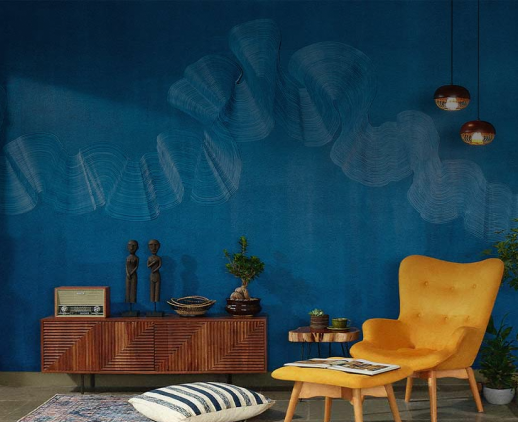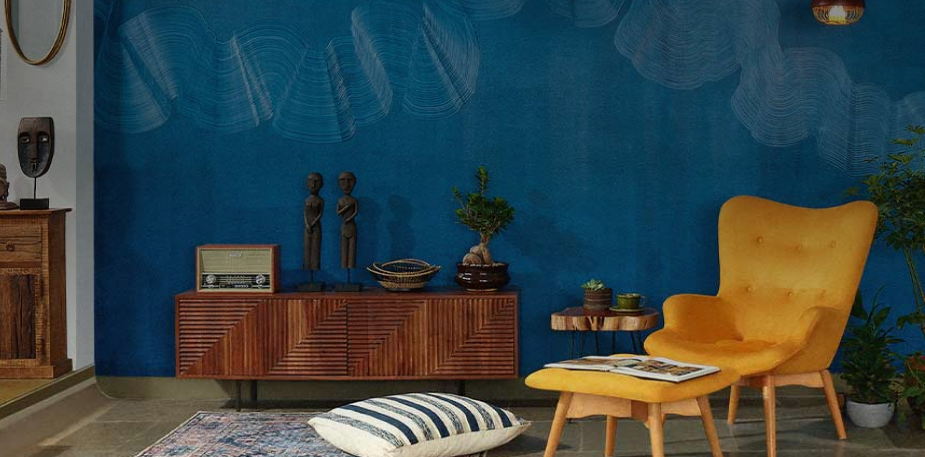-
Design Ideas
Living Room Designs Modular Kitchen Designs Bedroom Designs Bathroom Designs Dining Room Designs Pooja Room Designs Study Room Designs Balcony Designs Wardrobe Designs False Ceiling Designs Home Office Design Crockery unit Design Tile Designs Bed Designs Flooring Designs Foyer Designs TV Unit Designs
- Offering
- Testimonials
-
Budget Calculator

-
Discover your Design Style

- Design Guide
- By City
Looking for expert guidance to design your
Leave your information and we will call you to book your preferred consultation slot
Events expert Vandana Mohan tells us how celebrations will change this festive season

Thirty years ago, Vandana Mohan founded her event management company and filled a void that India didn’t know existed. Backstage Productions didn’t just give structure to an industry whose lack had gone unnoticed; it also offered Mohan an opportunity to make a career doing what she enjoyed, given her interest in media and advertising. Hers was the go-to agency when international brands (think Gucci, Ferragamo, Moët & Chandon, Dom Pérignon) descended on Indian shores. “Fashion was very big for us, we did a lot of fashion work, including the first show that Chanel ever did outside Paris,” she says.
Then, twenty years ago, she found herself planning the wedding of a client’s daughter, and she yet again found herself on the cusp of a significant milestone—becoming one of the first such companies to make wedding planning professional, serious business. One of the most sought-after wedding planners in the country, and beautifulhomes.com’s guest stylist for this festive season, Vandana talks to us about the Wedding Design Company and the world of celebrations in a post-pandemic era.
Beautiful Homes (BH): What prompted you to diversify into wedding management?
Vandana Mohan (VM): A [Backstage Productions] client’s daughter was getting married and he asked us to do the wedding. As an event management company, we already had the tools required to plan and execute it; we dealt with technology and technical aspects like light, sound, etc. It was about adding the wedding aesthetic to it. Flowers were always a strong point with me, even when we were doing our own events; we just enhanced and modified it to suit wedding celebrations.

Vandana Mohan, founder of Wedding Design Company and wedding planner extraordinaire, is our guest stylist for festive season 2020.
BH: How much of your clientele is for events and how much for weddings?
VM: I’d say that 99 per cent is weddings and the 1 per cent for events is for some of the old clients who come to us, or some of the international brands.
BH: In the two decades since you established the Wedding Design Company, how had celebrations evolved in your opinion?
VM: When I started, there were only two or three people in the wedding business. Most weddings were done by florists or what in Delhi we call tent houses or in Bombay is called as decorators. My objective was to make the sense of design and aesthetic the most important part of a wedding—in terms of how to design a wedding, how to put it together and more than that, how to plan a wedding. We were the first company to actually give this thing an entire structure, some accountability and make it professional. Today nobody works without a wedding designer or a planner.
BH: The most exotic wedding locations where you’ve planned celebrations.
VM: We have done weddings in over 33 overseas destinations, including every possible city in Italy, Vienna, Mauritius, Spain, Arizona, Maldives. Florence and Salzburg remain favourites.

One of Vandana's clients' homes in Chittagong. The design for the decor was done in a way to make it look like a naturally overgrown garden.
BH: How has the current pandemic and the ensuing restrictions affected celebrations this year and how will things be going forward?
VM: Everything has become limited, not just in terms of numbers but in the scale of festivities too. We’re now calling these kinds of celebrations as intimate or micro weddings. The guest list typically comprises just about 30 to 50 people but the official number that you’re allowed depends on every state. In Delhi, for example, you’re allowed a 100 guests, which can go up to 200; however, the venue then has to be able to accommodate double the amount. So in a venue that can fit in 400 people, you’re allowed to host 200 people.
BH: Do you see this as the beginning of long-term changes in the scale of celebrations?
VM: I believe that is where we were inevitably headed. This generation of couples getting married are looking for something more meaningful and intimate. It’s just that the pandemic accelerated the process. Essentially, weddings are gearing towards more intimate and home-style celebrations.
BH: Apart from downsizing and sanitisation protocols, do you see anything about celebrations that began out of necessity this year becoming a trend, at least for the next two years or so?
VM: I think e-invites have been there for a while but that will continue being something that people will want to do, that’s one.
Another important element has been the creation of care packages, which I think will persist till people are absolutely confident and comfortable about mingling in larger crowds. At weddings we organise, we are creating these monogrammed, specially designed sanitisers or wipes as part of care packages. I think we’re going to see many more beauty and cosmetic companies coming with these kinds of packages, in-room hampers, travel kits and such.
Another trend I see happening is daytime festivities. If the government puts a time restriction for night-time celebrations or if hotels shut down early, a sundowner that follows after lunch and wrap up by 7.30 pm is a viable alternative.
BH: What are the changes you foresee in the near future as far as décor, dining, etc are concerned?
VM: I don’t think we’re going to see the extravagance of flowers that we used to see earlier though they will never completely go away. We use a lot of fresh flowers, so everything is done at the last minute because the flowers can only be picked the morning of a celebration. Now, with clients requesting for a trimmed down team at the venue, we’re integrating lights and structural elements. I think it’s going to be something that you can do offsite and bring it on, put it up immediately and not require working on-site.
BH: Anything not making a comeback?
VM: In terms of events in general, music festivals will take a long time to come back. I don’t think those are going to happen given the sheer size of the crowds. People are going to be nervous about the crowds at such concerts. Even Dussehra this year was so low-key, I think there are going to be more home-style festivities.

The setting for an intimate, sit down dinner in Delhi. The setting relied heavily on detailing and personalisation of the tablescape.
As far as weddings are concerned, I think big performances by big artists; I don’t see that coming back for a while. And in terms of sport, golf tournaments will definitely take off—that sport will do well.
BH: How do you see opulence and glamour manifesting itself in festivities?
VM: At some point, Indian weddings did get termed as the big fat Indian wedding. I think a large part was because of the fun, colour, emotion and bold sentimentality that characterise Indian celebrations, not the numbers—it never was. It was always about your immediate people. I think the trend now will be that people will realise that they can do small weddings.
BH: Any innovations that have been experimented with that you see becoming a trend?
VM: I had seen some really interesting designed bento boxes at a celebration. It will be interesting to see how this catches on, along with use crockery that’s disposable but interestingly done. These also becomes more sustainable, recyclable. It’s a little bit of a wild card but for celebrations involving youngsters—where food is important but it’s more the bar—it could catch on.
BH: What’s the big change you see sticking on beyond the pandemic?
VM: The three-day wedding is becoming a two-day celebration; the big sangeet has probably gone away, with the mehendi and sangeet celebrations merging into one.
BH: What kind of advice do you give clients who are looking to celebrate or host events? What have the popular requests been?
VM: Open spaces as far as possible. Clients want to see how they can limit the teams working on an event (as far as can be managed, they’d rather not have to limit their guest lists), with a leaner team and multitask from an event perspective.
BH: Do you think this pandemic will see the end of destination weddings, at least for the next couple of years?
VM: Strangely, that has not been affected as one would have imagined. Of course, overseas destinations are not on the agenda in the foreseeable future, but newer destinations have come up, the kind that would never have even been considered. In this current climate, made in India has become the way to go. Rishikesh has become big. Any place that you can drive down to, whether it’s somewhere near Bombay, Puri, Agra, Jaisalmer, has become a destination for celebration. Boutique hotels too are becoming popular options, like the Rajvilas Oberoi near Jaipur, a beautiful property, was not considered as a wedding venue because of the limited number of rooms. But that’s changed now.
BH: Do you see celebrities sort of setting a precedent when it comes to quieter celebrations?
VM: I think in the last few years, celebrities have anyway been hosting celebrations on a smaller scale. When Virat (Kohli) and Anushka (Sharma) got married, it was a small wedding. Even when Priyanka Chopra got married, I don’t think she had a guest list of more than a 100 people, or perhaps less.

Get Started with your interior design journey with us!
Speak to our design professionals
What’s the status of your home possession?
What’s the condition of your home/space?
Will you be living in your space during the renovation?
 Previous Question
Previous Question
Is your interior design budget over 4 lakhs?
 Previous Question
Previous Question
Book next available appointment slots with our experts!
Please Select Date and Day
 Previous Question
Previous Question

Something went wrong!
We were unable to receive your details. Please try submitting them again.

Appointment Scheduled!
Thank you for giving an opportunity to Asian Paints Beautiful Homes Service! Our Customer Experience Specialist will get in touch with you soon.
Appointment Date & time
Thank You!
Our team will contact you for further details.
What’s the status of your home possession?
What’s the condition of your home/space?
Will you be living in your space during the renovation ?
 Previous Question
Previous Question
Is your interior design budget over 4 lakhs?
 Previous Question
Previous Question
Book next available appointment slots with our experts!
DEC 2023
Please Select Date and Day
 Previous Question
Previous Question

Something went wrong!
We were unable to receive your details. Please try submitting them again.

Appointment Scheduled!
Thank you for giving an opportunity to Asian Paints Beautiful Homes Service! Our Customer Experience Specialist will get in touch with you soon.
Appointment Date & time
17 Oct 23, 03.00PM - 04.00PM

















